 Cruising for sales: Mango's famous face, Penélope Cruz.
Cruising for sales: Mango's famous face, Penélope Cruz.
Amid the shakeout in the Spanish fashion retail business, which has seen firms like Custo Barcelona, Saez Merino and Coronel Tapiocca brought low and closing stores, giants Mango and Inditex have made some profitable strategic decisions.
Both Mango and Inditex have put more focus on international markets, particularly in the Asia Pacific, Eastern Europe and the Middle East.
At the same time, Hong Kong-listed Esprit plans to take advantage of lower retail rents in Spain to leverage options in the European market, with a focus on low- to mid-range priced fashion goods aimed at young Spanish shoppers.
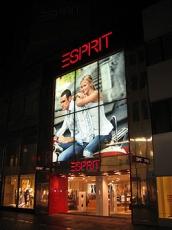 Esprit in Spain, taking advantage of rentals.*
Esprit in Spain, taking advantage of rentals.*
In each case, Hong Kong suppliers are able to track opportunities as they follow the strategic patterns adopted by these successful global brands.
Mango followed its promotion plan in the international market by opening two new stores on the Chinese mainland in September. The first was at the Sanlitun shopping mall in Beijing, occupying 417 sqm.
The second store was in the Plaza 353 shopping mall in Shanghai, a 710 sqm property on two floors and built in the 1930s, which accommodates Mango's art deco-style fittings.
In 2007, the Chinese market represented just 2% of total turnover for the Mango chain, but recent months have seen other store openings in Kunming, Zhijiazhuang, Shenzhen, Tianjin, Wuxi, Nanning, Hangzhou, Jinan, Zhengzhou and Fuzhou, despite lower retail expectations on the Mainland.
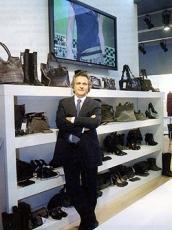 Mango's director Isak Halfon presides over China push.
Mango's director Isak Halfon presides over China push.
Additionally, Mango's management has been putting together some new lines, with Mango Touch outlets in Andorra, France and Russia, while the broad range of Mango lines has been aimed at international travellers at airports, including Hong Kong, Gatwick, Dusseldorf and Munich, as well as Madrid.
Analysts in Hong Kong expect Mango to continue to take a very channelled approach to its international customer profile, cutting inventory and looking for pared wholesale prices amid uncertain demand.
But that hasn't stopped the chain from embarking on a new line of fashion clothing for men, called HE. So far, the strategy has been successful and Mango plans to build on a new branded HE chain, initially in Madrid, London and Paris, after opening its first store in Barcelona in October.
Nor has the focus on value customers stopped Mango from sizing up the Middle East for longer-term opportunities. The company has announced a bold plan to open up to 10 stores in Iran and Iraq over the next five years, with the first outlets to open in Tehran and Erbil respectively.
Inditex building on fashion diversity and logistics
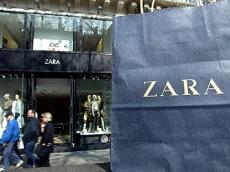 Zara well placed to weather downturn.
Zara well placed to weather downturn.
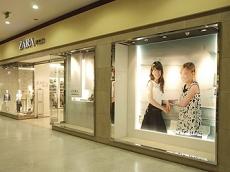 Sales set to be stable.
Sales set to be stable.
Inditex is well placed to weather the global consumer slowdown, according to a note in October from JP Morgan analysts. The textile group that owns the world's largest fashion chain, Zara, should be a long-term investment because of its geographical diversity, with just 35% of its invoices corresponding to Spanish consumer sales, JP Morgan wrote.
According to the note, Inditex is forecast to see its sales grow 11% in 2009, compared to 15% this year, slightly off the bank's initial forecast, but still good by world standards.
 Staff watch for fashion trends, like the Carla Bruni look.
Staff watch for fashion trends, like the Carla Bruni look.
Although Inditex is banking on its 9% first half sales growth, analysts expect it to weather the economic downturn quite well, after the company overtook both GAP of the US and H&M of Sweden in the same mid-range category. The group currently has some 3,900 stores in 70 countries.
Its usual approach is to set up "insignia" stores aimed at building its name in a pre-surveyed location before setting up smaller outlets of different but related brands to allow economies of scale and boost profit margins.
Inditex's brand diversity is backed by the group's approach to vertical integration in design, production, logistics and sales, with sales staff expected to acquaint designers of fashion trends. There's hardly any advertising, so that the store's look represents its only interface with potential customers.
Esprit making the most of lower rents in Spain
By contrast with the global outlook from Spain's larger players, Hong Kong-listed Esprit is expanding in the Spanish as well as Italian markets, specifically targeting youthful, fashion-conscious consumers that are also looking for modest prices.
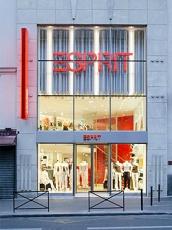 Planning on a Spanish recovery.*
Planning on a Spanish recovery.*
Esprit just opened its first store in central Barcelona, with President Thomas Grote quoted as saying that the Spanish and Italian markets are priorities; the chain is prepared to wait as each market convulses and picks up bargain retail sites when sales return to greater stability.
The financial crisis has seen the Spanish clothing sector accelerate its restructuring because overall sales fell by 12% between January and August, according to data from Acotex, the employer's association.
The first victim of the crisis was Saez Merino, which makes, among other items, the Lois brand of denims. Another branded fashion house, Caramelo, re-organised its management team, fired 20 workers and is negotiating the closure of its main store in Barcelona, amid news of difficulties in paying suppliers.
Coronel Tapiocca has closed a dozen stores, among which is the first it opened in Madrid, while Adolfo Dominguez's profits have fallen around 70%, forcing the company to reduce the number of planned openings. They are also studying the advisability of renewing leases due to expire.
Related News
Photos
More>>trade
market
- Celebs arrive at the 35th annual People's Choice awards in L.A.
- Magic Millions - David Jones Racing Fashion Preview
- Emporio Armani - Milan Menswear - Autumn/Winter 2009/10
- Burberry Prorsum - Milan Menswear Autumn/Winter 2009/10
- UK: Be a Girls Aloud-alike: The copycat clothing site that's beating the





